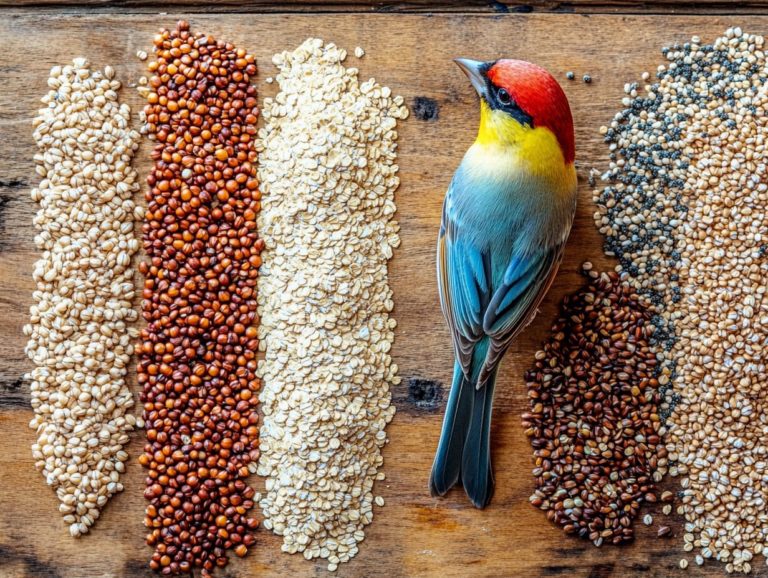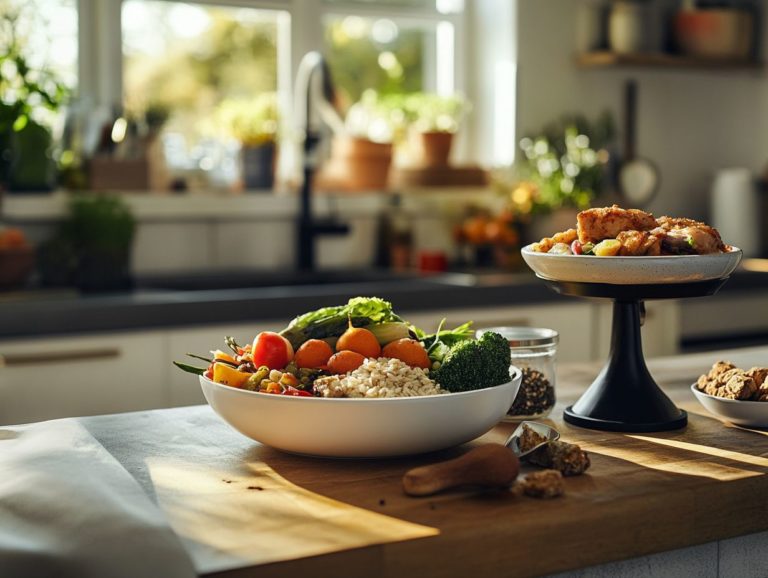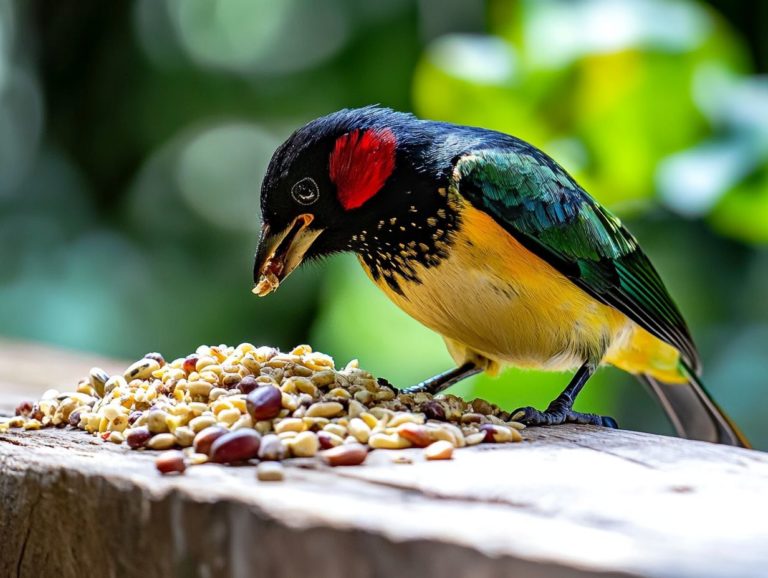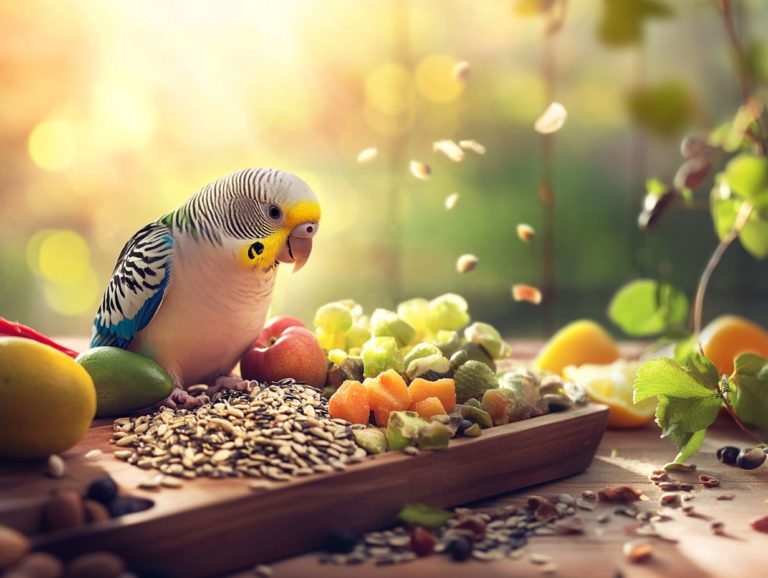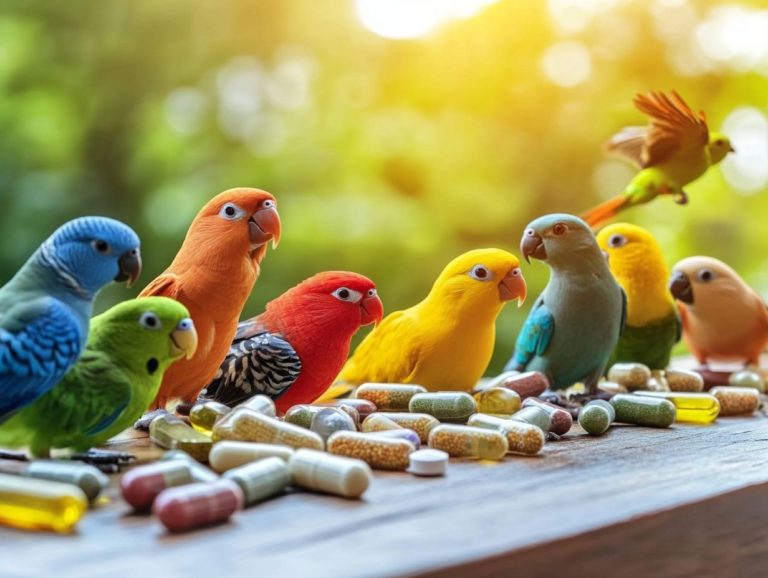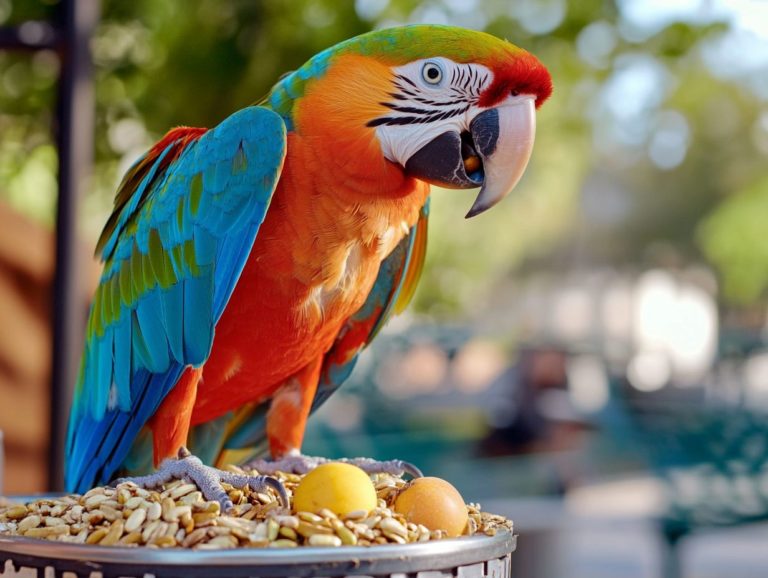The Best Food Combinations for Parrots
When it comes to ensuring your parrot remains both happy and healthy, a balanced diet is absolutely essential. These vibrant creatures flourish on a diverse array of foods that supply the crucial nutrients they need.
This article delves into the ideal food combinations for your feathered companion. It covers everything from colorful fruits and crunchy nuts to protein sources and superfoods. It also emphasizes what to avoid and offers innovative feeding ideas to keep mealtime exciting!
By the end, you ll possess the knowledge necessary to optimize your parrot’s diet, paving the way for a longer, healthier life.
Contents
- Key Takeaways:
- 1. Fruits and Vegetables
- 2. Nuts and Seeds
- 3. Grains and Legumes
- 4. Protein Sources
- 5. Dairy Products
- 6. Healthy Fats
- 7. Herbs and Spices
- 8. Superfoods
- 9. Foods to Avoid
- 10. How to Incorporate These Foods into Your Parrot’s Diet
- What Should a Balanced Diet for a Parrot Look Like?
- Frequently Asked Questions
Key Takeaways:
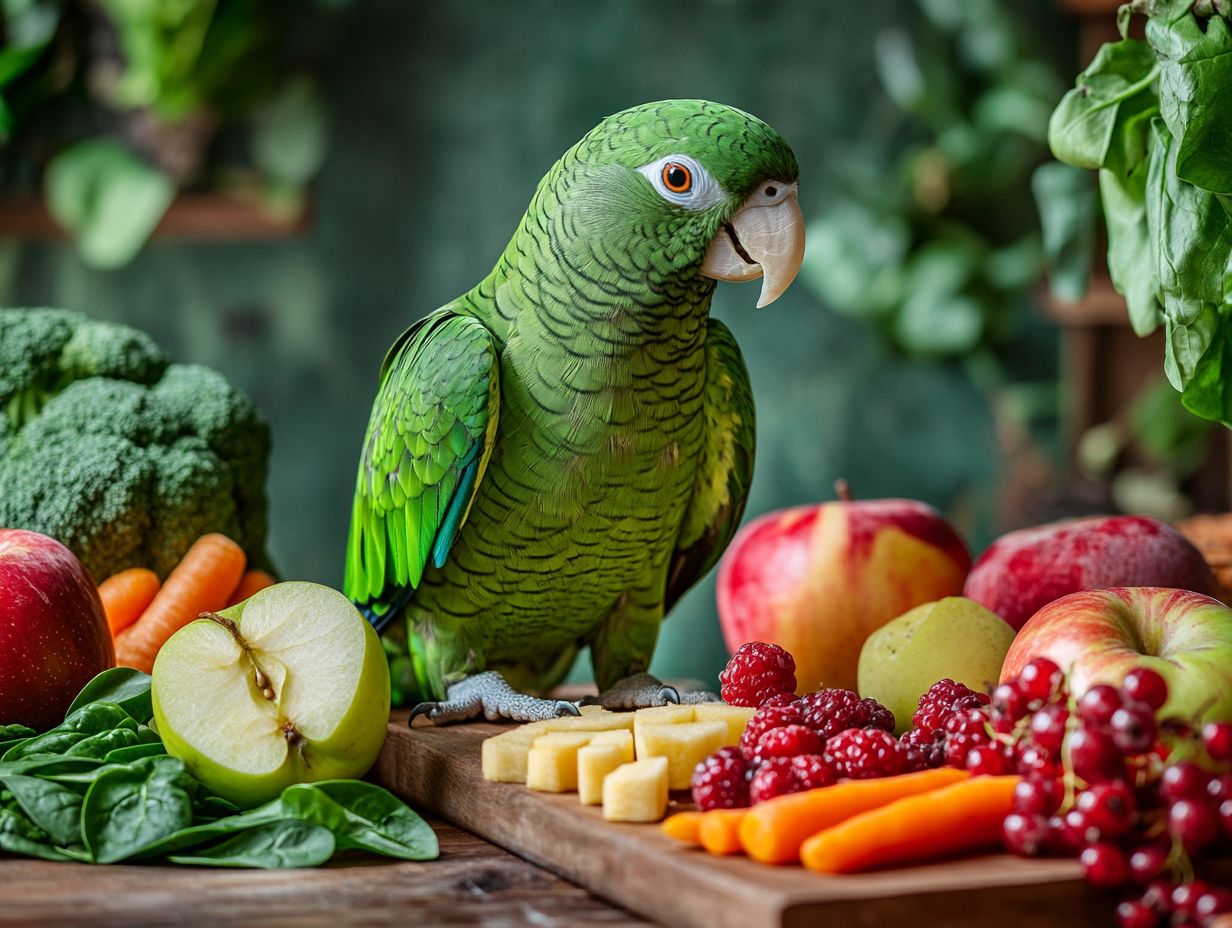
- Include a variety of fruits and vegetables in your parrot’s diet for essential vitamins and minerals.
- Nuts and seeds are a great source of healthy fats and protein for parrots.
- Don’t forget to include grains and legumes in your parrot’s diet for fiber and energy.
1. Fruits and Vegetables
Fruits and vegetables are essential to a parrot’s diet. They provide vital vitamins and minerals necessary for overall health. A colorful array of produce not only excites their natural behaviors but also elevates your bird care routine. This ensures a diverse and balanced nutritional intake within a lively enclosure.
Parrots, including species like the African Grey, Amazon, and cockatoos, thrive on a Fresh-Food Diet that closely resembles their natural habitats in tropical regions. Incorporating items such as bell peppers, carrots, and leafy greens offers crucial nutrients and helps maintain healthy plumage and beak condition.
For example, blueberries are loaded with antioxidants that bolster their immune system. Meanwhile, sweet potatoes serve as an excellent source of beta-carotene, which helps improve vision.
It’s important to introduce new fruits and vegetables gradually. Always keep an eye out for any adverse reactions. By balancing these fresh foods with high-quality pellets and steering clear of toxic items like chocolate and avocado, you can create a well-rounded diet. Regularly rotating different produce encourages exploration and sparks playfulness, enriching their environment!
2. Nuts and Seeds
Your parrot will love these delightful nuts and seeds! They serve as a rich source of healthy fats, protein, and essential nutrients that support their energetic lifestyle and overall well-being.
While many parrots, such as parakeets and cockatoos, revel in foraging for these tasty morsels, it s crucial for you to maintain dietary balance to prevent obesity and related health issues. These treats should complement a varied diet that includes high-quality commercial pellets and fresh produce.
Different species have unique preferences; for example, macaws often gravitate toward larger nuts like Brazil nuts and almonds, while smaller birds like budgerigars thrive on sunflower seeds and hemp seeds. These nuts and seeds not only tantalize their taste buds but also provide heart-healthy omega-3 fatty acids, antioxidants, and vital minerals like calcium.
However, moderation is essential! Overindulgence can lead to fatty liver disease and other metabolic challenges. To ensure a well-rounded and satisfying diet for your parrot, introduce these foods gradually and keep an eye on any dietary fluctuations.
This approach will help you avoid imbalances and create a nourishing experience for your feathered friend.
3. Grains and Legumes
Incorporating grains and legumes into your parrot’s diet is essential for providing vital carbohydrates and fiber. These nutrients play a crucial role in maintaining energy levels and digestive health.
For species-specific diets, such as those tailored for African Grey or Amazon parrots, adding whole grains and legumes can facilitate an easy switch from a seed diet to a more balanced nutritional approach.
Options like quinoa, brown rice, and lentils deliver essential amino acids, which are the building blocks of protein. They support strong feather development and overall vitality.
Preparing these grains is simple cooking methods like boiling or steaming effectively retain their nutritional value, making it easy for you to include them in your pet s meals.
You can mix cooked grains with fresh fruits or vegetables to create a vibrant, appetizing dish that piques your parrot’s natural curiosity. Gradually introducing these foods into their daily routine can significantly enhance their diet, ensuring they receive a well-rounded nutritional profile.
This balanced approach contributes to their longevity and happiness.
4. Protein Sources
Protein sources are vital for your parrot’s diet, delivering essential amino acids needed for growth, repair, and overall vitality especially for energetic aviary dwellers. By incorporating a range of protein options like legumes, cooked eggs, and specific nuts, you can meet the diverse dietary needs of different species.
It’s essential to keep an eye on both the type and quantity of protein consumed. For example, beans and lentils are outstanding choices; they’re packed with protein and fiber, supporting digestive health.
Adding cooked eggs not only provides crucial nutrients but also serves as a delightful treat that keeps your feathered friends engaged. However, make sure to monitor your parrot s nut intake, as they are high in fat and can contribute to energy without providing the necessary protein boost.
Striking a careful balance ensures your avian companions receive all the nutrients they need without the risk of obesity or related health issues.
5. Dairy Products
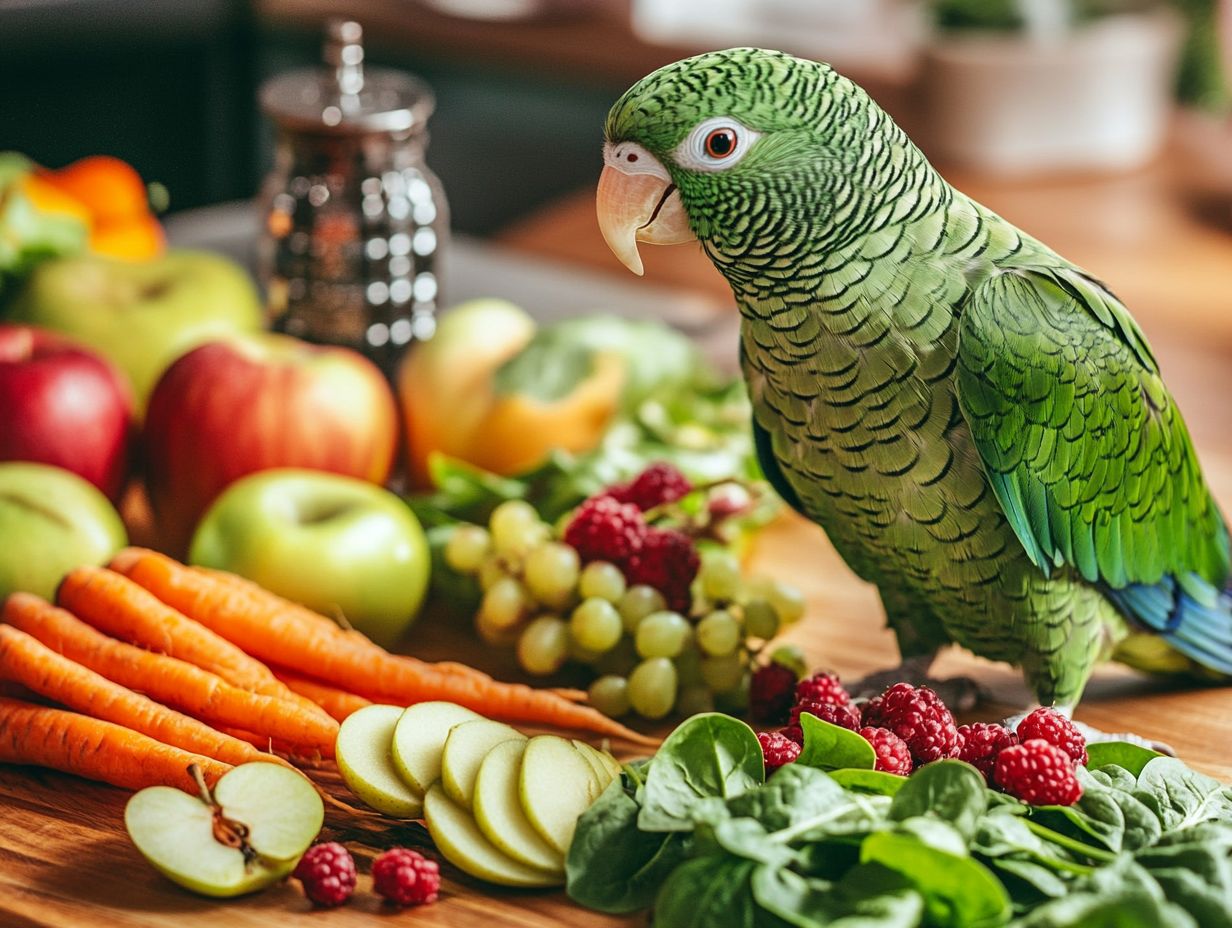
While many parrots are lactose intolerant, you can still offer some dairy products in moderation, such as yogurt or cheese, as sources of calcium and other essential nutrients. These can aid in maintaining their feather condition and overall health.
It’s crucial to understand each bird’s individual dietary preferences and restrictions when introducing these foods. Some parrots thrive on small amounts, while others might not tolerate them well.
Make sure to keep an eye on species-specific dietary needs, as certain types of dairy may be more suitable for particular birds. For those needing calcium but unable to handle lactose, consider alternatives like fortified leafy greens, crushed eggshells, or specially formulated calcium supplements.
Incorporating seeds and nuts rich in calcium, such as almonds and sesame seeds, can further complement their diet. Balancing these elements in your parrot’s meals promotes robust health and vitality, ensuring they receive all the necessary nutrients without distress.
6. Healthy Fats
Healthy fats are an essential part of your parrot’s diet, providing the energy needed to support various bodily functions, from feather health to hormone production. Keep an eye on fat content to help prevent obesity, especially when transitioning from a traditional seed diet or commercial pellets to a varied menu filled with natural foods.
You can incorporate healthy fats from sources like nuts and seeds to significantly boost your parrot’s nutrition. Consider options such as walnuts, almonds, and sunflower seeds; they deliver essential fatty acids and contribute to overall well-being.
Introduce these foods gradually, ensuring they comprise no more than 10-15% of the total diet to maintain a balanced intake. By emphasizing moderation and variety, you can help your feathered friend thrive, flaunt vibrant plumage, and support optimal health all without the worry of excessive fat consumption.
7. Herbs and Spices
Incorporating herbs and spices into your parrot’s diet can elevate not just the flavor but also the nutritional profile, introducing a delightful array of essential vitamins and antioxidants. Many parrots are adventurous eaters. By offering fresh herbs like basil, cilantro, or parsley, you can stimulate their foraging instincts while positively impacting their health and dietary variety.
These aromatic additions do more than just enhance meals; they bring a host of health benefits. For instance, basil is packed with vitamin K and boasts anti-inflammatory properties. Cilantro can assist in detoxifying heavy metals from their systems.
Imagine your parrot thriving on a variety of delicious foods! Experimenting with different ways to introduce these herbs can be quite enjoyable. You might consider finely chopping them and mixing them into your parrot’s favorite fruits or veggies, or even creating herbal blends to sprinkle over larger meals this keeps their diet engaging and exciting.
Fresh food should be a cornerstone of their nutrition, as it promotes optimal digestion and overall vitality. In this context, herbs serve as a flavorful yet essential component of a well-balanced diet.
8. Superfoods
Discover how these nutrient-rich foods can boost your parrot’s health! Superfoods are an excellent addition to your parrot’s home diet, providing a concentrated source of nutrients that support their overall well-being. Incorporating items such as sprouted seeds and other natural foods can enhance your feathered friend’s dietary variety and contribute to a healthier lifestyle.
Superfoods are foods packed with nutrients that can elevate your parrot’s diet, offering significant health benefits that promote overall well-being and vitality. Consider integrating items like quinoa, spirulina, and goji berries into your feeding routine. These foods provide a rich source of vitamins, minerals, and antioxidants, effectively addressing common health concerns.
By incorporating these superfoods into their meals, you can ensure your feathered companions enjoy a more diverse nutrient profile. For example, quinoa not only delivers a hearty dose of protein but also includes essential amino acids crucial for growth and maintenance. Spirulina can boost the immune system with its impressive antioxidant levels, while goji berries serve as an excellent source of vitamin C, supporting eye health and overall vitality.
When introducing these foods, it s important to pay attention to your parrot’s individual tastes and preferences. Gradually mixing them into their regular diet can encourage acceptance and make mealtime a delightful experience.
9. Foods to Avoid
Being aware of foods to avoid is crucial for you as a parrot owner. Many common items can be toxic or harmful, potentially leading to severe health issues. Understanding which foods pose risks like chocolate, avocado, and certain seeds is essential for developing safe dietary guidelines and preventing feeding challenges for you and your feathered friend.
Did you know that chocolate can be deadly for your parrot? Recognizing the risks of these foods will help ensure your parrot’s well-being and longevity. For instance, chocolate contains theobromine, a substance found in chocolate that is toxic to birds, while avocado has persin that can lead to respiratory distress. Certain fruit seeds and pits, such as those from apples and cherries, contain cyanide compounds. Act quickly to remove these dangerous foods from your parrot s environment! It s wise to stock up on safe alternatives like fresh fruits, vegetables, and specially formulated parrot pellets.
You can create a designated eating area to keep your parrot safe and minimize the risk of accidental ingestion. By taking these precautions, you can foster a healthier, happier life for your parrot.
10. How to Incorporate These Foods into Your Parrot’s Diet
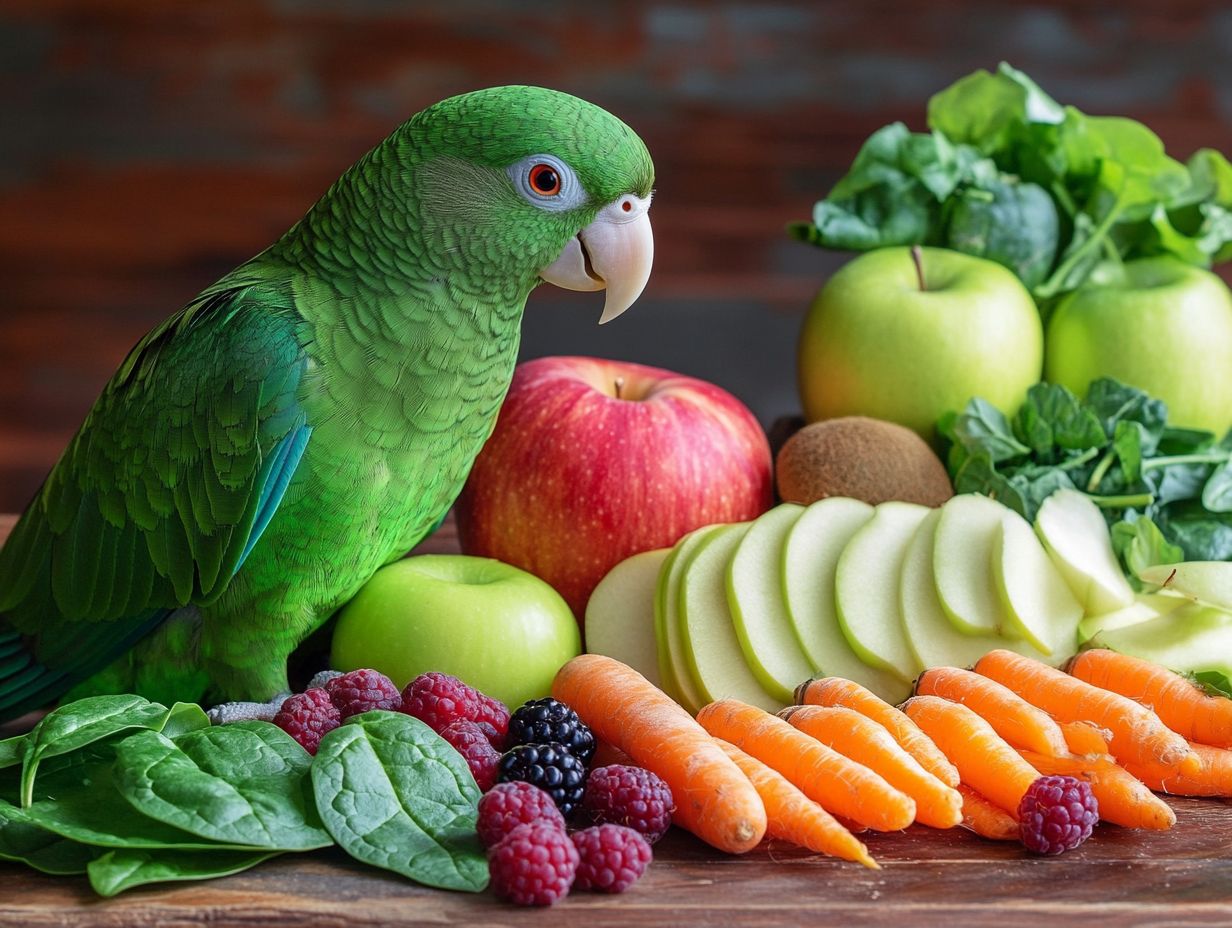
Incorporating various foods into your parrot’s diet requires a thoughtful approach. Consider their nutritional needs and individual preferences.
Gradually introduce fresh options like fruits, vegetables, grains, and healthy fats. This approach enhances their well-being and meets dietary guidelines tailored for your feathered companion.
To start this transition, offer new foods alongside those they already enjoy, giving your parrot the chance to explore at their own pace. Watch their reactions and eating habits; tracking which foods are nibbled or ignored in a journal can provide valuable insights into their tastes.
Patience is key, as some parrots may need time to warm up to new food items. Creating a fun feeding schedule will help your parrot get excited about new foods!
This thoughtful method nurtures a diverse diet and cultivates trust and curiosity in your feathered friend.
What Should a Balanced Diet for a Parrot Look Like?
A balanced diet for your parrot should include a delightful variety of food types tailored to meet their unique nutritional needs, ensuring optimal health and well-being. Think fresh fruits and vegetables, healthy fats from nuts and seeds, grains, legumes, and a selective sprinkle of commercial pellets.
Understanding the right proportions for each food type is essential. Leafy greens and vividly colored veggies should make up around 30-50% of their diet.
Whole grains and legumes should contribute about 20-30%. Nuts and seeds can be offered in moderation, accounting for 10-15%, given their calorie density.
It’s worth noting that different parrot species come with their own dietary preferences and nutritional requirements. Young birds need more protein and fiber for growth, while older parrots might thrive on lower-fat options.
Offering a varied diet prevents boredom and ensures your parrot receives a rich spectrum of essential vitamins and minerals.
What Nutrients Are Essential for Parrots?
Essential nutrients are crucial for the well-being of your parrot, encompassing a balanced intake of vitamins, minerals, protein, and healthy fats that support their overall health and vitality. It’s vital for you to understand the specific nutritional requirements of each species to prevent health issues stemming from deficiencies.
A diverse diet rich in vitamin A think carrots and leafy greens is essential for maintaining your parrot’s healthy eyesight and immune function. B vitamins, found in whole grains and legumes, offer critical support for their metabolism and energy production.
Calcium and phosphorus, often sourced from leafy vegetables, nuts, and seeds, are necessary for strong bones and effective muscle function. Neglecting adequate protein can lead to poor feather quality and diminished vitality, so it’s important to incorporate legumes, seeds, and nuts into their meals.
A balanced diet not only wards off these deficiencies but also enhances their overall well-being, paving the way for a longer, healthier life.
How Can a Parrot’s Diet Affect Their Health and Behavior?
A parrot’s diet holds significant sway over its physical health and behavior. It influences everything from feather condition to energy levels and overall temperament. Diets rich in unhealthy fats and lacking important nutrients can lead to obesity and various health issues. In contrast, a balanced and diverse feeding regimen fosters a happy, active parrot with enriched behavioral responses.
When you notice changes in your parrot’s behavior, like increased aggression or lethargy, it may signal dietary deficiencies or excesses. Keeping a keen eye on how different foods affect their mood and activity levels is crucial.
Incorporating a variety of fresh fruits, vegetables, and high-quality pellets into their meals ensures they receive a well-rounded intake of vitamins and minerals. It can also enhance their social interactions and cognitive function. Regularly assessing their diet based on these observations allows you to create a diet that your parrot will love, helping to maintain a healthy and engaging environment for your feathered companion.
What Are Some Common Nutritional Deficiencies in Parrots?
Common nutritional deficiencies in parrots can lead to a host of health issues impacting their feather condition, immune function, and overall vitality. By recognizing the signs of these deficiencies, you can make informed dietary adjustments that promote a balanced nutritional profile and enhance your parrot s health.
You might notice symptoms like feather plucking, lethargy, or a dull beak. These are red flags indicating your feathered friend may lack essential nutrients such as vitamin A, calcium, or essential fatty acids. Addressing these deficiencies is often as simple as incorporating a diverse range of fruits, vegetables, and specially formulated pellets into their daily meals.
Regularly evaluating their diet and consulting with an avian veterinarian a vet who specializes in birds enables you to identify potential shortcomings and tailor a nutrition plan that meets their unique needs. This ensures your parrot thrives and remains vibrant.
What Are Some Fun and Creative Ways to Feed Your Parrot?
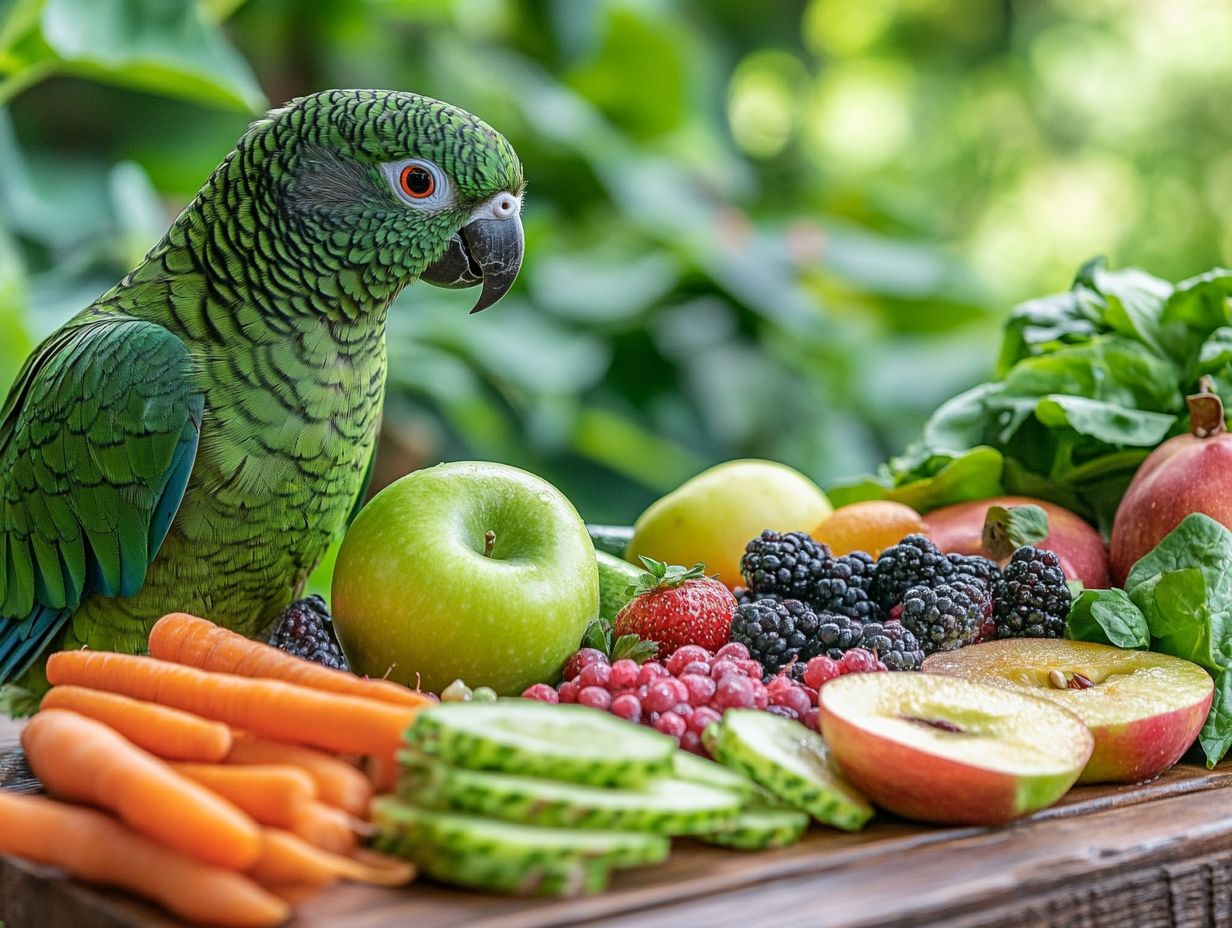
Engaging your parrot during mealtime with fun and creative feeding strategies can truly elevate their foraging instincts and overall enjoyment. Turn a simple diet into an enriching experience! By utilizing puzzle feeders, hanging food toys, and incorporating a delightful array of textures and flavors, you can stimulate their curiosity and encourage healthy eating habits.
Rotating different food options like colorful fruits, crisp vegetables, and specially formulated pellets keeps mealtime fresh and exciting. This prevents boredom and inspires exploration. Offering treats in imaginative ways, such as hiding them among leaves or inside chewable toys, not only mimics their natural behaviors but also adds an element of thrill to feeding time.
As you observe how they interact with new offerings, you ll gain valuable insights into their preferences. This variety nourishes their bodies and supports mental stimulation, reinforcing the bond between you and your feathered friend while promoting their overall well-being.
Frequently Asked Questions
What yummy foods should I mix for my parrot?
The best food combinations for parrots include a mix of fresh fruits, vegetables, seeds, and pellets, which are essential for understanding the nutritional needs of parrots.
Can parrots eat only seeds and maintain a healthy lifestyle?
No, parrots need a balanced diet and should not rely solely on seeds. It’s important to include fresh fruits and vegetables in their diet as well.
Are there any specific fruits that are good for parrots?
Yes, some of the best fruits for parrots include apples, bananas, grapes, and berries.
Can parrots eat cooked food?
Yes, parrots can eat cooked food such as grains, rice, and pasta. However, it should not be the main part of their diet.
Are there any foods that parrots should avoid?
Yes, parrots should avoid avocados, chocolate, caffeine, and alcohol. These can be toxic to them.
Start improving your parrot’s diet today for a happier, healthier companion!
How often should I change my parrot’s food combinations?
Change your parrot’s food combinations daily. This variety ensures they receive essential nutrients.
Nutrients are the vitamins and minerals that help keep your parrot healthy. Also, it keeps their meals interesting and prevents boredom.
Give your parrot a fresh mix every day! It’s vital for their health and keeps mealtime fun!

